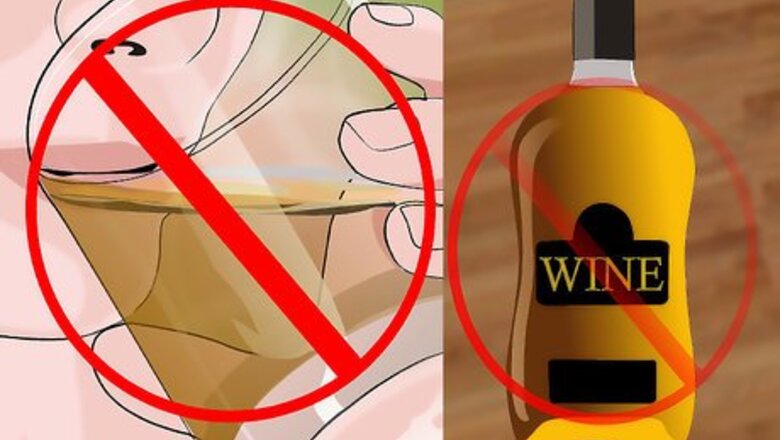
views
X
Trustworthy Source
Cleveland Clinic
Educational website from one of the world's leading hospitals
Go to source
In most cases this causes no symptoms, but sometimes it allows partially digested food and stomach acid to reflux back up into your esophagus, leading to painful heartburn and indigestion. The symptoms of hiatal hernias can often be controlled by dietary and lifestyle adjustments — only a small minority of cases need surgery.
Altering Your Drinking Habits
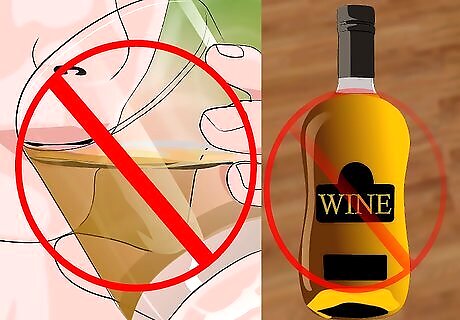
Cut back on alcohol. Alcoholic beverages can irritate a hiatal hernia in a few different ways. Alcoholic drinks, especially red wine and beer, are very acidic, so they should be avoided in general (particularly in the evenings) if you have a history of heartburn. Secondly, the alcohol (ethanol) is damaging to the tissues of your esophagus, esophageal sphincter and stomach, which can trigger acid reflux and other symptoms. All alcoholic beverages can potentially irritate a hiatal hernia, although the least acid types tend to contain the least amount of sugar, such as a vodka and soda, or a white wine spritzer. Alcohol relaxes the lower esophageal sphincter, which allows contents to reflux into the esophagus. Excessive drinking also increases the risk of forceful vomiting, which can make a hiatal hernia worse.
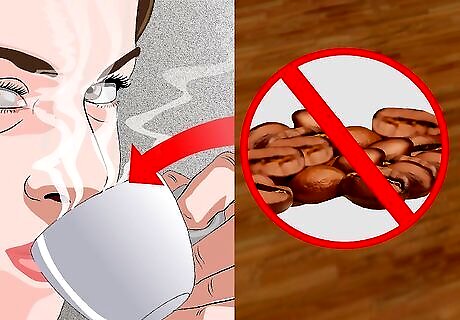
Reduce caffeinated beverages. Caffeine is a stimulant that affects your body in many ways, most of them negatively. More specifically, it can irritate the stomach and relax smooth muscle tissue (which lines the esophagus), so people with a hiatal hernia should reduce or eliminate caffeine from their diet if they want to control symptoms. Caffeine is found in coffee, black and green teas, soda pop (especially colas), energy drinks and chocolate. Many of the drinks that contain caffeine are also very acidic, which is like a "double whammy" for people with hiatal hernias. Avoid coffee and colas at the very least.
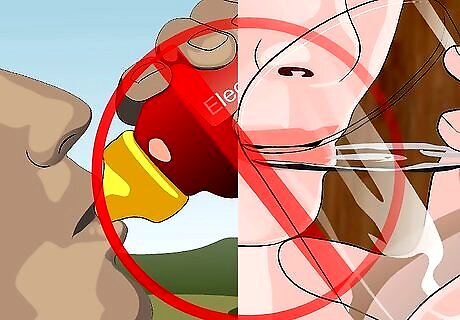
Don't drink too many fluids with meals. Although many people believe they need to wash their food down with fluids (such as water, milk or sodas), it's actually not a good idea. Drinking lots of water or other fluids with meals tends to dilute your saliva and the digestive enzymes in your stomach and small intestine, making them less effective. Furthermore, the extra volume in the stomach might encourage some sloshing up of the acidic contents into the esophagus, leading to heartburn. As noted above, chewing your food well produces lots of saliva, which aids with digestion and helps you swallow it comfortably. Drink no more than a few ounces of water (or milk) with meals. Drink water before a meal if you're truly thirsty. Drinking or gulping fluids can also lead to aerophagia, which is the swallowing of air while eating. Aerophagia can aggravate a hiatal hernia and lead to belching and indigestion.
Changing Your Eating Habits
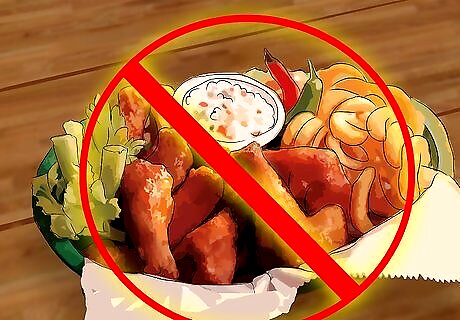
Avoid foods that trigger heartburn. Lots of foods can trigger heartburn (the spilling of stomach contents into the lower esophagus) because they're either too acidic, sweet, spicy or gassy. Everyone's tolerances and sensitivities are different, but if you have a hiatal hernia, you should avoid peppery foods, tomato-based foods, onions, citrus fruits and chocolate products. Fried and fatty foods can also trigger heartburn and irritate the esophagus and weaken the valve (esophageal sphincter) between the esophagus and stomach. In addition to heartburn, common symptoms of a hiatal hernia include: abdominal pain, bloating, frequent burping, difficulty swallowing, sore throat, feeling too full, fatigue and sometimes vomiting. Chronic heartburn can also lead to bad breath, but avoid sucking on mints or candy (especially peppermints) because that can make the heartburn worse. Foods less likely to cause heartburn symptoms include the following: bananas, apples, green beans, peas, carrots, broccoli, grains, cereals, cheeses, milk, and yogurt.
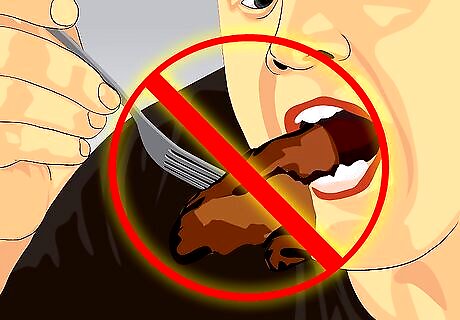
Don't eat large meals. In addition to the types of foods you eat, the portion sizes can also trigger the symptoms of a hiatal hernia. Thus, eat smaller meals more frequently throughout the day (similar in size to large snacks) in order to prevent over-filling your stomach and putting pressure on the esophageal sphincter. Americans tend to take much larger portion sizes than they need for adequate energy and nutrition, so reducing them will not likely rob you of necessary nutrients. Instead of three large meals per day, eat five smaller (and blander) meals spaced out by about two-and-a-half hours. Don't let others dish up your plate when at home. Help yourself and don't feel the need to fill up your entire plate to the edges. If you're very hungry, force yourself to take a small serving initially. Eat slowly and only take a second small serving if you're still hungry.
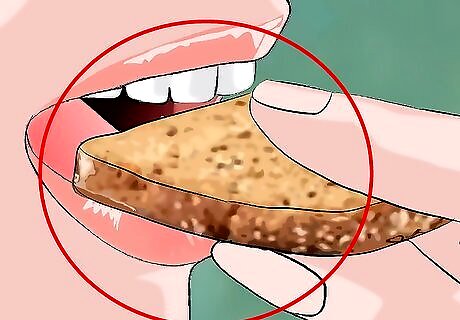
Spend more time chewing. Chewing your food properly is important because not only are you "pre-digesting" and absorbing some of the nutrients in your mouth, but you're also stimulating the release of extra saliva into your mouth. Saliva is alkaline (which combats the acidity of food) and helps coat and soothe the lining of your esophagus, which can reduce heartburn and other symptoms related to a hiatal hernia. Take smaller bites and spend at least 20 – 30 seconds chewing your food before you swallow it. Cut up your food into smaller portions to encourage taking smaller bites. Cutting food up will also allow it to cool down faster. If your mouth feels dry before a meal, suck on a piece of lemon (limes and grapefruits work well also) in order to stimulate the release of saliva from your saliva glands.
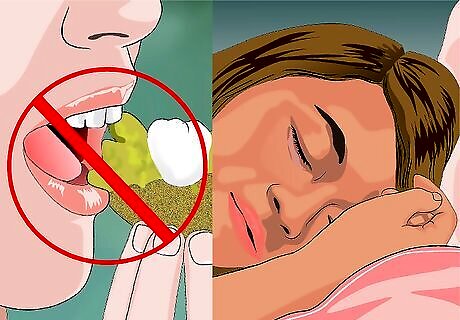
Avoid eating just prior to bedtime. In addition to the type and portions of food, the timing of your meals is also very important for controlling the symptoms of a hiatal hernia. More specifically, you should eat dinner (or your final meal of the day) at least two to three hours before bedtime in order to give your stomach enough time to digest the food and then release its contents into the small intestine. Going to bed full and laying horizontal makes it easier for the acidic contents of the stomach to spill out through the esophageal sphincter and into the esophagus, causing heartburn. It takes longer for dense meals to digest (such as steak) compared to breads, pastas, salads and cooked veggies. Always sit up while eating and avoid lying down or bending over immediately after any meal. Go for a light walk if a meal makes you feel very sleepy instead of napping. Wear pants that are loose around your stomach when eating to reduce pressure you might feel from restrictive clothing.
Lifestyle Adjustments
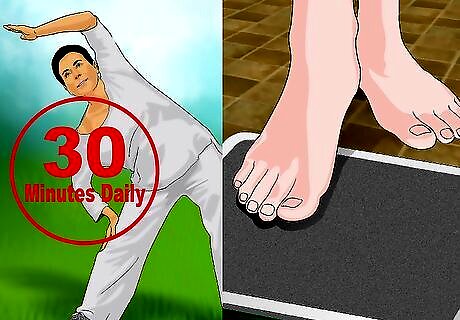
Lose weight if you're too heavy. One of the most commonly recommended lifestyle adjustments for people with hiatal hernias is to lose weight if they're overweight or obese. Overweight people are more prone to hiatal hernias due to a combination of factors, including: overeating and large meal portions, chronic heartburn, excessive consumption of caffeine, alcohol, fatty, fried foods — which damage/inflame the esophagus and esophageal sphincter. Losing weight puts less pressure on the abdominal and chest area, where the stomach and esophagus lay underneath. The safest and most effective way to lose weight is reducing your daily calories along with regular exercise — at least 30 minutes daily. Reducing your daily calories by only 500 can result in approximately 4 pounds of lost fat per month, even if you don't exercise that much. Keeping a weight loss journal, either on paper or using an app on your smartphone, to record all of the food that you ingest will help you stay on top of your progress.
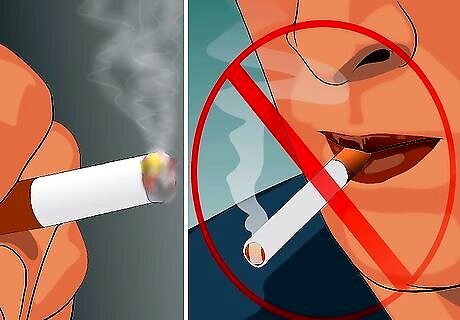
Quit smoking. Similar to alcohol, the various toxic chemicals in cigarette smoke are damaging to the inner parts of the esophagus/stomach and can damage the esophageal sphincter — essentially making it leaky and unable to fully close. Consequently, it's recommended that people with hiatal hernias stop smoking as soon as they can. Cancer of the esophagus is much more common with smokers too, which can mimic the symptoms of a hiatal hernia (at least initially). Smoking also damages the airways and increases the risk of chronic coughing. The force of coughing so much can weaken your diaphragm muscles and contribute to the formation of a hiatal hernia. Further, smoking stimulates the production of acid in the stomach. In addition to nicotine patches, hypnotherapy can be very helpful for stopping smoking.
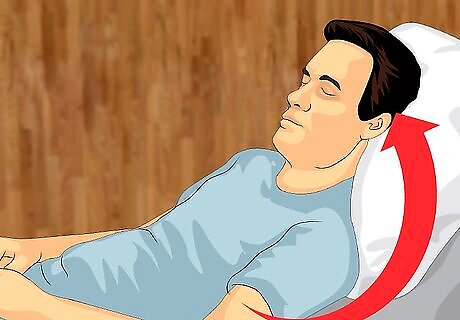
Elevate your head while sleeping. Although sleeping or napping after a meal is a no-no for those who experience chronic heartburn, once you have properly digested your food, raise your head when you lay down on your back. Elevating your head by about 6 inches or so while in bed or on the sofa works with gravity to keep your stomach's contents from spilling up into your esophagus. While in bed or on the sofa, prop your head up with an extra pillow, although be careful not to get a stiff neck or trigger a headache. Consider buying a mattress that can be adjusting electronically and adjust the head portion to an incline between 6 – 8 inches. You can also elevate the top portion of your body if you lay on your side by using extra pillows, but you'll also increase the risk of getting back pain. Try not to eat anything one to two hours before you do to bed. A good habit to practice is to not eat food too late in the evening.
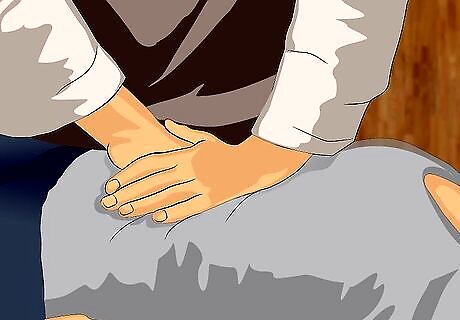
See a chiropractor. Although chiropractors typically focus on treating the spinal column and peripheral joints, some also specialize in soft-tissue treatment of hiatal hernias. The idea is to push the stomach back to its normal position below the diaphragm by applying pressure with the hands — sort of like a deep tissue massage. The procedure can give great relief, albeit sometimes only temporary relief (hours to days). Other professions that include practitioners that do soft-tissue manipulation for the purposes of controlling hiatal hernias include massage therapists, physiotherapists, naturopaths and osteopaths. According to mainstream medicine, there's no evidence that such soft-tissue manipulation works to cure hiatal hernias, as no research has been done yet.



















Comments
0 comment